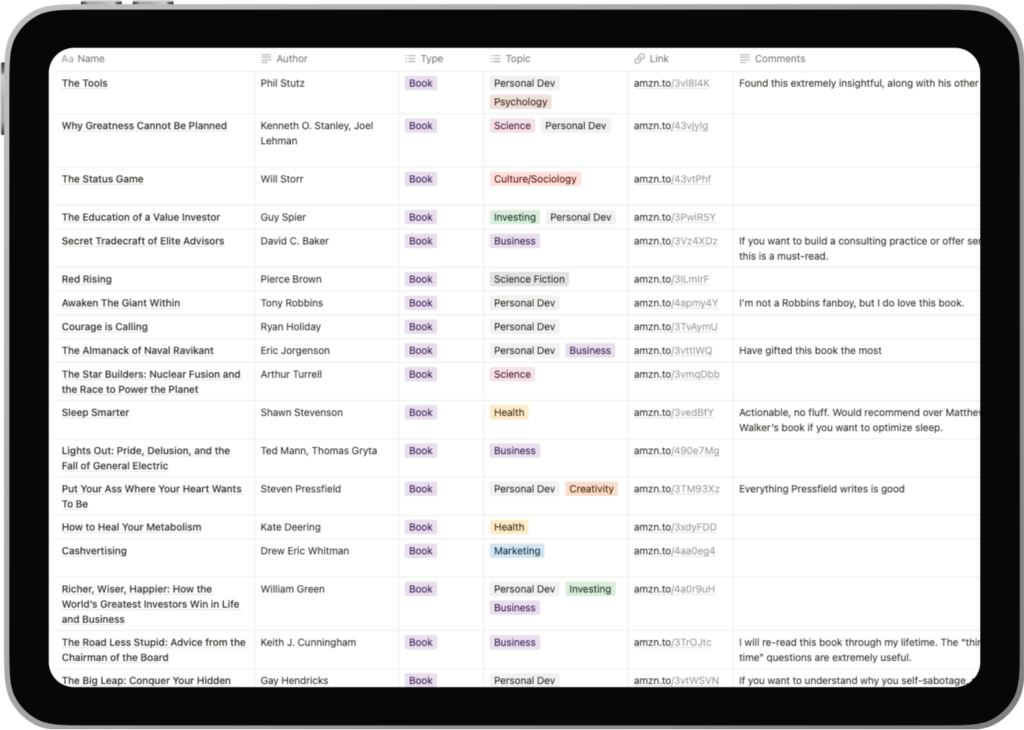Hey,
Continuing my thoughts from last week on the future of online education.
If you missed part 1, you can read it here.
As I wrote last week, I believe the future of online education is:
- Atomized
- Action-based and results-focused
- Community-centric
- Reputation-driven
Let’s dive into each of these.
Atomization
Prior to the internet, education was mostly localized.
If you wanted to learn economics, you went to the local university. Or if you were smart, you moved to another state or country to get better education from a better professor at a better school.
So there was some optionality, but nowhere near as much as there is today. If you live in a 2nd world country with internet access, you can take an economics course from a distinguished professor for free.
The only reason you’d actually go to school to learn a subject is because you need a degree—for signalling purposes to get the job you want.
As the need for signalling (hopefully) decreases, the best teachers will win. And they’ll win via the internet.
This atomization does mean more competition, because there’s no location-based or institutional moat.
In other words, if you’re tenure at a mid-grade university—you’re fine. Students need to come to you (due to a number of factors, like location and need for signalling). But on the internet, you need to compete with the best. And where you live doesn’t matter.
In some sense, this is a “victor wins all the spoils” game. The educator who is excellent will do 100x better than the one who’s just “good.” 100x better in reach, student results, and maybe even income.
The reason for this is simple: people want to learn from the best. And if the best is more accessible than ever, that’s what they’ll do.
In another sense, the “victor wins all the spoils” is only half-true, because markets are big. And the future is creator-led.
People want to learn from people they like.
And if you build a personal brand that connects with a significant number of people—maybe because you’re more interesting than the other guy, or funnier, or better-looking, or whatever—you can build a successful educational business around your brand, even if you’re not the best.
In short: atomization = individual creators > institutions.
Action-based & results-focused
Online education is already shifting in this direction.
10 years ago, you could create a high-level theoretical course on a topic and make money from it.
Now, people expect results-focused learning.
Because doing = learning.
Instead of taking a course on “How to write to build your personal brand” that covers high-level theory and principles…
You’re much better off taking a cohort-based course like Ship 30 for 30, where the whole point of joining the course is that you write an essay every day. The course content is secondary to the action you need to take.
Likewise, over at EDMProd we have a course called EDM Foundations. The main pitch is that you finish 4 songs in 4 weeks. All the educational content centers around that, instead of just teaching students random tips and tricks for how to produce better music.
Community-centric
One thing physical schools have over online schools is the community element.
You connect with others, in person. You talk education. You go to parties. You make friends.
Call me a luddite but I don’t think this can be replaced by online communities. We should strive to connect more often in-person. And any online attempt to replicate face-to-face interaction is insufficient.
However, some community is better than none. And having a community attached to your online course is practically a necessity—especially if what you’re teaching is action/project based and you’re charging a decent amount of money.
Not only does it improve learning outcomes (accountability), it also makes taking a course more fun.
Reputation-driven
One criticism of online education is:
“It’s impossible to distinguish a shitty course from a good course.”
I don’t agree that it’s impossible, but it can be hard if you don’t know what you’re looking for.
But I’m confident this will change over time.
The best educators will have their own personal brand. And a personal brand rests on reputation.
If you’re selling a shitty course, your reputation won’t last. You can’t hide from bad reviews on the internet, or tweets that criticize your course.
You can see this in the internet marketing/info product space right now. Many of the marketers-turned-educators who don’t really care about their students but are just trying to make a quick buck are struggling.
Why? Because they lack a solid reputation.
Compare this to someone like David Perell who doesn’t engage in high-pressure sales tactics, doesn’t grift, doesn’t jump from trend to trend, and instead has built a solid reputation. He can keep going for decades.
Conclusion
That concludes my thoughts on the future of online education.
There’s a significant chance I could be completely wrong about a lot of this, but I do think many of these trends are already happening and only going to strengthen.
I’m specifically curious about how institutions will adapt. I’m not convinced they’re just going to crumble and die. Universities are lindy. They have been around for a long, long time.
If you have any thoughts on this topic, I’d love to hear. Just reply to this email. Let’s start a conversation.
-Sam

